Importance of Professionalism, Legal and Ethical Regulatory Requirements, Person-Centred Care and Nursing Theories in Adult Nursing: A Case Study
VerifiedAdded on 2023/06/10
|8
|2579
|72
AI Summary
This essay discusses the importance of professionalism, legal and ethical regulatory requirements, person-centred care and nursing theories in adult nursing through a case study. It covers NICE guidelines for UTI treatment, personal behaviour and practice standards as per NMC, key legal and ethical regulatory requirements and policies, and nursing theories for effective care.
Contribute Materials
Your contribution can guide someone’s learning journey. Share your
documents today.
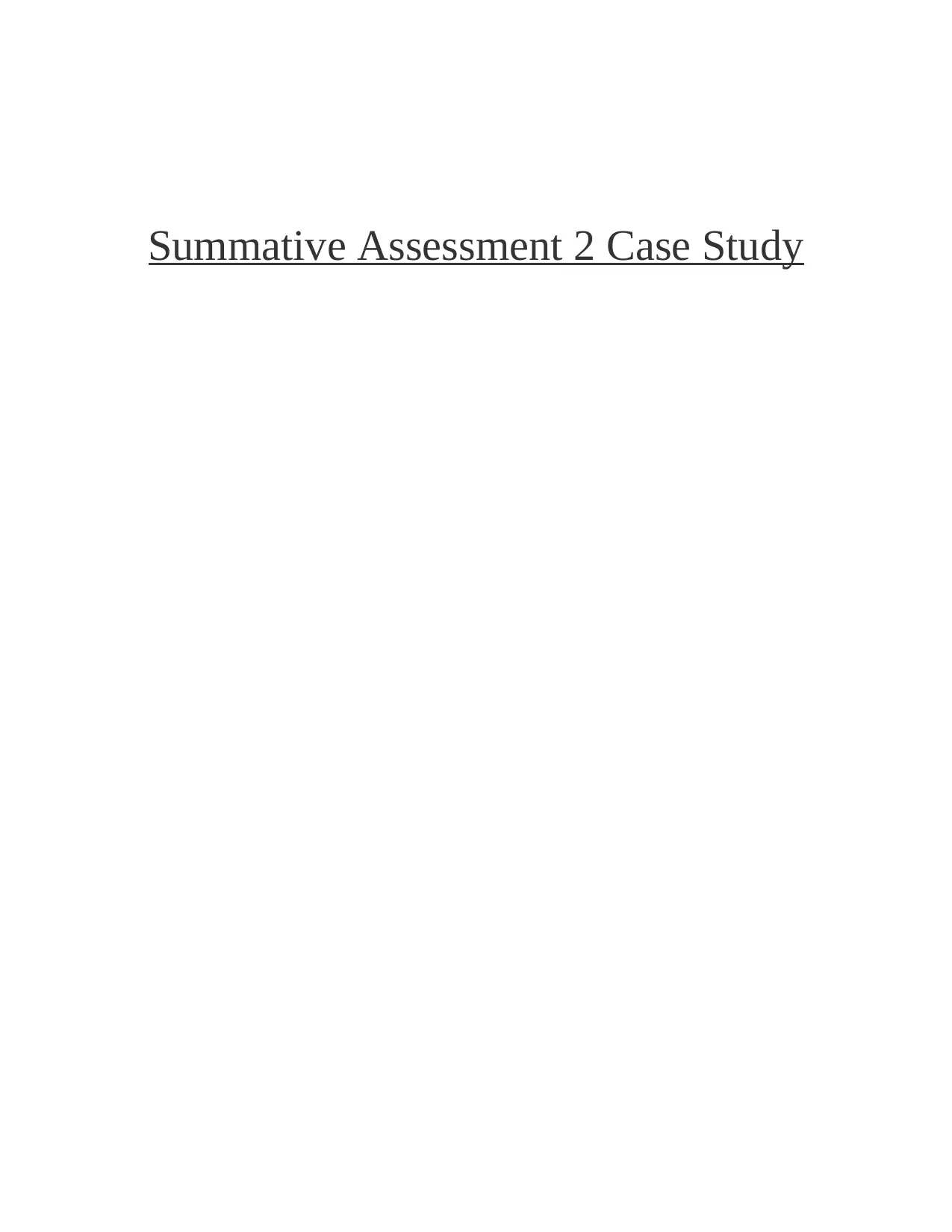
Summative Assessment 2 Case Study
Secure Best Marks with AI Grader
Need help grading? Try our AI Grader for instant feedback on your assignments.
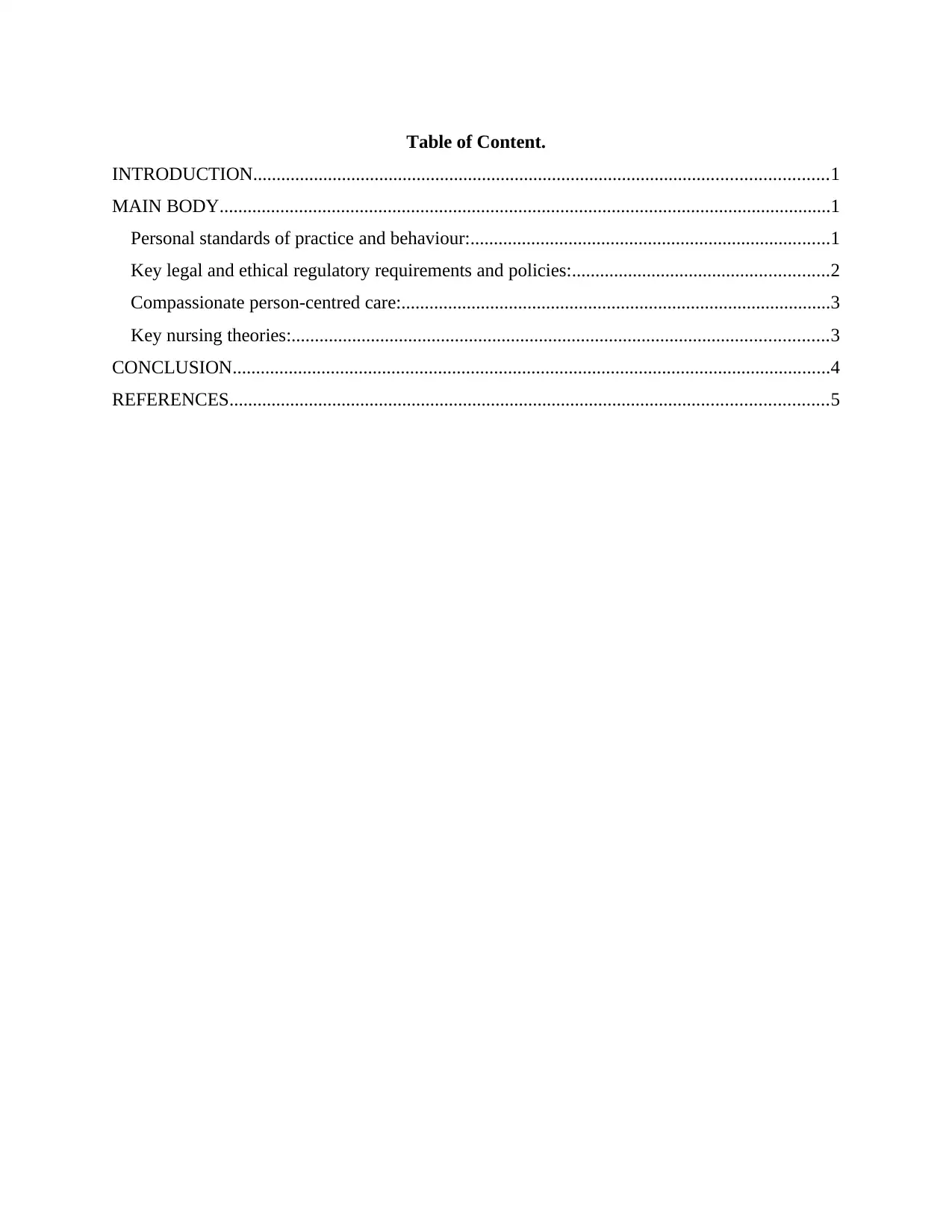
Table of Content.
INTRODUCTION...........................................................................................................................1
MAIN BODY...................................................................................................................................1
Personal standards of practice and behaviour:.............................................................................1
Key legal and ethical regulatory requirements and policies:.......................................................2
Compassionate person-centred care:............................................................................................3
Key nursing theories:...................................................................................................................3
CONCLUSION................................................................................................................................4
REFERENCES................................................................................................................................5
INTRODUCTION...........................................................................................................................1
MAIN BODY...................................................................................................................................1
Personal standards of practice and behaviour:.............................................................................1
Key legal and ethical regulatory requirements and policies:.......................................................2
Compassionate person-centred care:............................................................................................3
Key nursing theories:...................................................................................................................3
CONCLUSION................................................................................................................................4
REFERENCES................................................................................................................................5
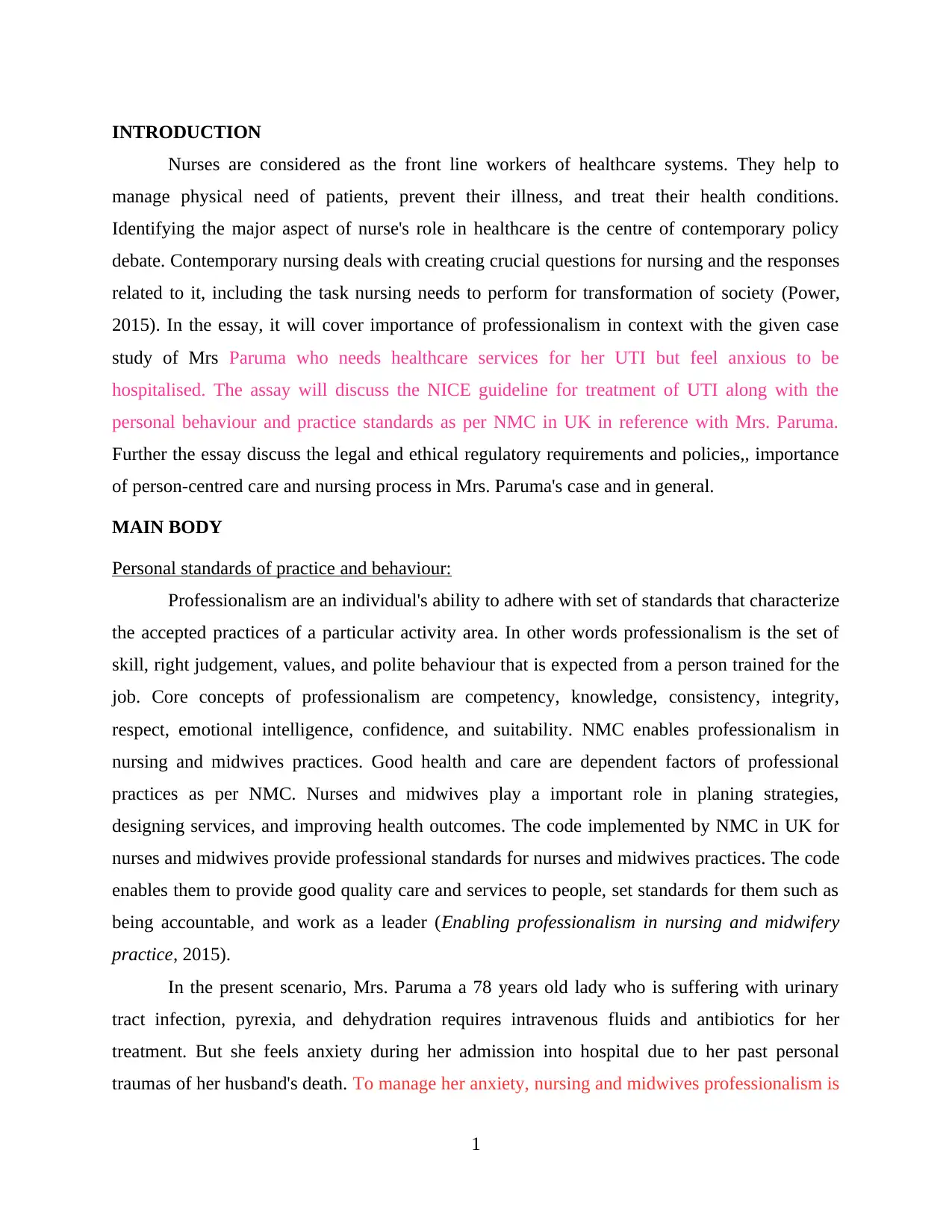
INTRODUCTION
Nurses are considered as the front line workers of healthcare systems. They help to
manage physical need of patients, prevent their illness, and treat their health conditions.
Identifying the major aspect of nurse's role in healthcare is the centre of contemporary policy
debate. Contemporary nursing deals with creating crucial questions for nursing and the responses
related to it, including the task nursing needs to perform for transformation of society (Power,
2015). In the essay, it will cover importance of professionalism in context with the given case
study of Mrs Paruma who needs healthcare services for her UTI but feel anxious to be
hospitalised. The assay will discuss the NICE guideline for treatment of UTI along with the
personal behaviour and practice standards as per NMC in UK in reference with Mrs. Paruma.
Further the essay discuss the legal and ethical regulatory requirements and policies,, importance
of person-centred care and nursing process in Mrs. Paruma's case and in general.
MAIN BODY
Personal standards of practice and behaviour:
Professionalism are an individual's ability to adhere with set of standards that characterize
the accepted practices of a particular activity area. In other words professionalism is the set of
skill, right judgement, values, and polite behaviour that is expected from a person trained for the
job. Core concepts of professionalism are competency, knowledge, consistency, integrity,
respect, emotional intelligence, confidence, and suitability. NMC enables professionalism in
nursing and midwives practices. Good health and care are dependent factors of professional
practices as per NMC. Nurses and midwives play a important role in planing strategies,
designing services, and improving health outcomes. The code implemented by NMC in UK for
nurses and midwives provide professional standards for nurses and midwives practices. The code
enables them to provide good quality care and services to people, set standards for them such as
being accountable, and work as a leader (Enabling professionalism in nursing and midwifery
practice, 2015).
In the present scenario, Mrs. Paruma a 78 years old lady who is suffering with urinary
tract infection, pyrexia, and dehydration requires intravenous fluids and antibiotics for her
treatment. But she feels anxiety during her admission into hospital due to her past personal
traumas of her husband's death. To manage her anxiety, nursing and midwives professionalism is
1
Nurses are considered as the front line workers of healthcare systems. They help to
manage physical need of patients, prevent their illness, and treat their health conditions.
Identifying the major aspect of nurse's role in healthcare is the centre of contemporary policy
debate. Contemporary nursing deals with creating crucial questions for nursing and the responses
related to it, including the task nursing needs to perform for transformation of society (Power,
2015). In the essay, it will cover importance of professionalism in context with the given case
study of Mrs Paruma who needs healthcare services for her UTI but feel anxious to be
hospitalised. The assay will discuss the NICE guideline for treatment of UTI along with the
personal behaviour and practice standards as per NMC in UK in reference with Mrs. Paruma.
Further the essay discuss the legal and ethical regulatory requirements and policies,, importance
of person-centred care and nursing process in Mrs. Paruma's case and in general.
MAIN BODY
Personal standards of practice and behaviour:
Professionalism are an individual's ability to adhere with set of standards that characterize
the accepted practices of a particular activity area. In other words professionalism is the set of
skill, right judgement, values, and polite behaviour that is expected from a person trained for the
job. Core concepts of professionalism are competency, knowledge, consistency, integrity,
respect, emotional intelligence, confidence, and suitability. NMC enables professionalism in
nursing and midwives practices. Good health and care are dependent factors of professional
practices as per NMC. Nurses and midwives play a important role in planing strategies,
designing services, and improving health outcomes. The code implemented by NMC in UK for
nurses and midwives provide professional standards for nurses and midwives practices. The code
enables them to provide good quality care and services to people, set standards for them such as
being accountable, and work as a leader (Enabling professionalism in nursing and midwifery
practice, 2015).
In the present scenario, Mrs. Paruma a 78 years old lady who is suffering with urinary
tract infection, pyrexia, and dehydration requires intravenous fluids and antibiotics for her
treatment. But she feels anxiety during her admission into hospital due to her past personal
traumas of her husband's death. To manage her anxiety, nursing and midwives professionalism is
1
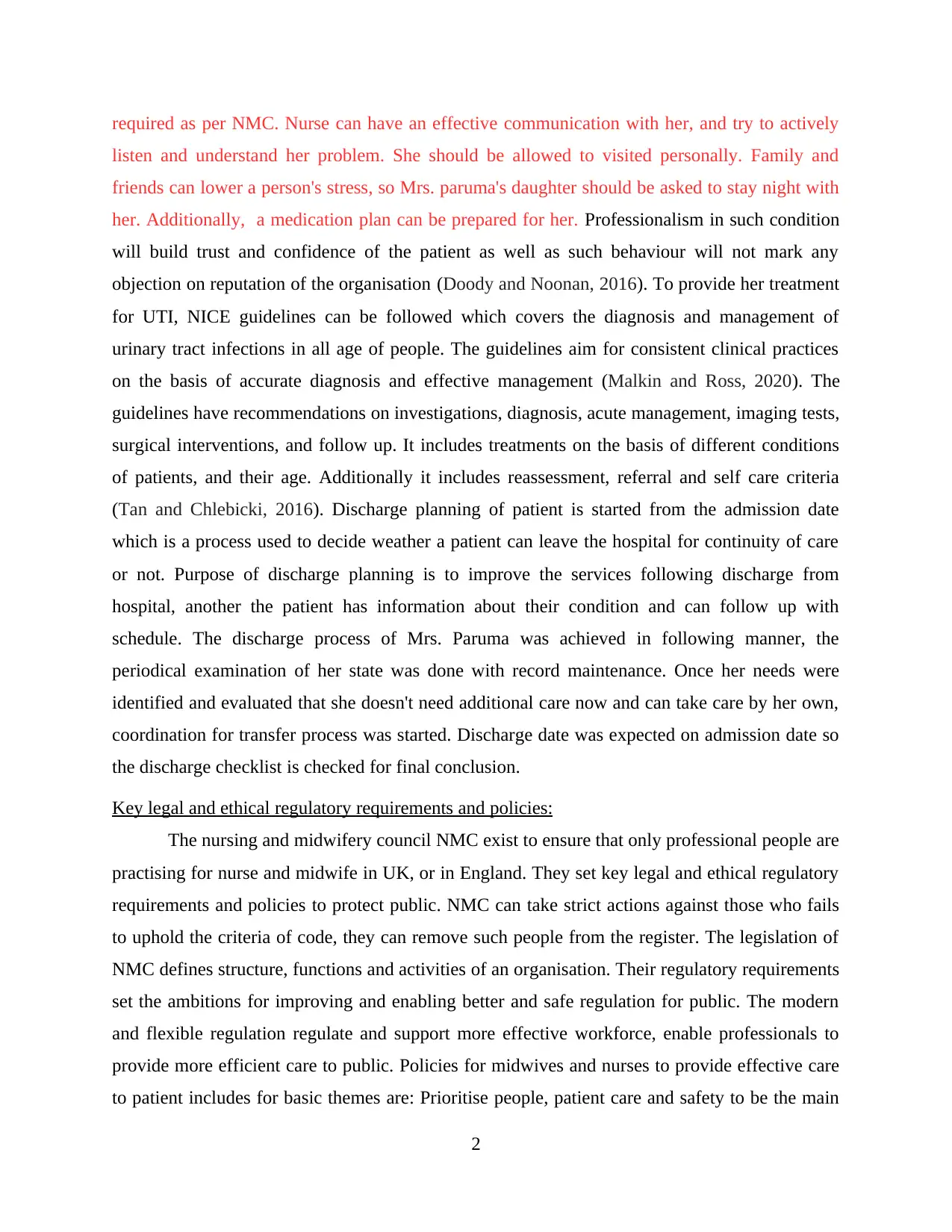
required as per NMC. Nurse can have an effective communication with her, and try to actively
listen and understand her problem. She should be allowed to visited personally. Family and
friends can lower a person's stress, so Mrs. paruma's daughter should be asked to stay night with
her. Additionally, a medication plan can be prepared for her. Professionalism in such condition
will build trust and confidence of the patient as well as such behaviour will not mark any
objection on reputation of the organisation (Doody and Noonan, 2016). To provide her treatment
for UTI, NICE guidelines can be followed which covers the diagnosis and management of
urinary tract infections in all age of people. The guidelines aim for consistent clinical practices
on the basis of accurate diagnosis and effective management (Malkin and Ross, 2020). The
guidelines have recommendations on investigations, diagnosis, acute management, imaging tests,
surgical interventions, and follow up. It includes treatments on the basis of different conditions
of patients, and their age. Additionally it includes reassessment, referral and self care criteria
(Tan and Chlebicki, 2016). Discharge planning of patient is started from the admission date
which is a process used to decide weather a patient can leave the hospital for continuity of care
or not. Purpose of discharge planning is to improve the services following discharge from
hospital, another the patient has information about their condition and can follow up with
schedule. The discharge process of Mrs. Paruma was achieved in following manner, the
periodical examination of her state was done with record maintenance. Once her needs were
identified and evaluated that she doesn't need additional care now and can take care by her own,
coordination for transfer process was started. Discharge date was expected on admission date so
the discharge checklist is checked for final conclusion.
Key legal and ethical regulatory requirements and policies:
The nursing and midwifery council NMC exist to ensure that only professional people are
practising for nurse and midwife in UK, or in England. They set key legal and ethical regulatory
requirements and policies to protect public. NMC can take strict actions against those who fails
to uphold the criteria of code, they can remove such people from the register. The legislation of
NMC defines structure, functions and activities of an organisation. Their regulatory requirements
set the ambitions for improving and enabling better and safe regulation for public. The modern
and flexible regulation regulate and support more effective workforce, enable professionals to
provide more efficient care to public. Policies for midwives and nurses to provide effective care
to patient includes for basic themes are: Prioritise people, patient care and safety to be the main
2
listen and understand her problem. She should be allowed to visited personally. Family and
friends can lower a person's stress, so Mrs. paruma's daughter should be asked to stay night with
her. Additionally, a medication plan can be prepared for her. Professionalism in such condition
will build trust and confidence of the patient as well as such behaviour will not mark any
objection on reputation of the organisation (Doody and Noonan, 2016). To provide her treatment
for UTI, NICE guidelines can be followed which covers the diagnosis and management of
urinary tract infections in all age of people. The guidelines aim for consistent clinical practices
on the basis of accurate diagnosis and effective management (Malkin and Ross, 2020). The
guidelines have recommendations on investigations, diagnosis, acute management, imaging tests,
surgical interventions, and follow up. It includes treatments on the basis of different conditions
of patients, and their age. Additionally it includes reassessment, referral and self care criteria
(Tan and Chlebicki, 2016). Discharge planning of patient is started from the admission date
which is a process used to decide weather a patient can leave the hospital for continuity of care
or not. Purpose of discharge planning is to improve the services following discharge from
hospital, another the patient has information about their condition and can follow up with
schedule. The discharge process of Mrs. Paruma was achieved in following manner, the
periodical examination of her state was done with record maintenance. Once her needs were
identified and evaluated that she doesn't need additional care now and can take care by her own,
coordination for transfer process was started. Discharge date was expected on admission date so
the discharge checklist is checked for final conclusion.
Key legal and ethical regulatory requirements and policies:
The nursing and midwifery council NMC exist to ensure that only professional people are
practising for nurse and midwife in UK, or in England. They set key legal and ethical regulatory
requirements and policies to protect public. NMC can take strict actions against those who fails
to uphold the criteria of code, they can remove such people from the register. The legislation of
NMC defines structure, functions and activities of an organisation. Their regulatory requirements
set the ambitions for improving and enabling better and safe regulation for public. The modern
and flexible regulation regulate and support more effective workforce, enable professionals to
provide more efficient care to public. Policies for midwives and nurses to provide effective care
to patient includes for basic themes are: Prioritise people, patient care and safety to be the main
2
Secure Best Marks with AI Grader
Need help grading? Try our AI Grader for instant feedback on your assignments.
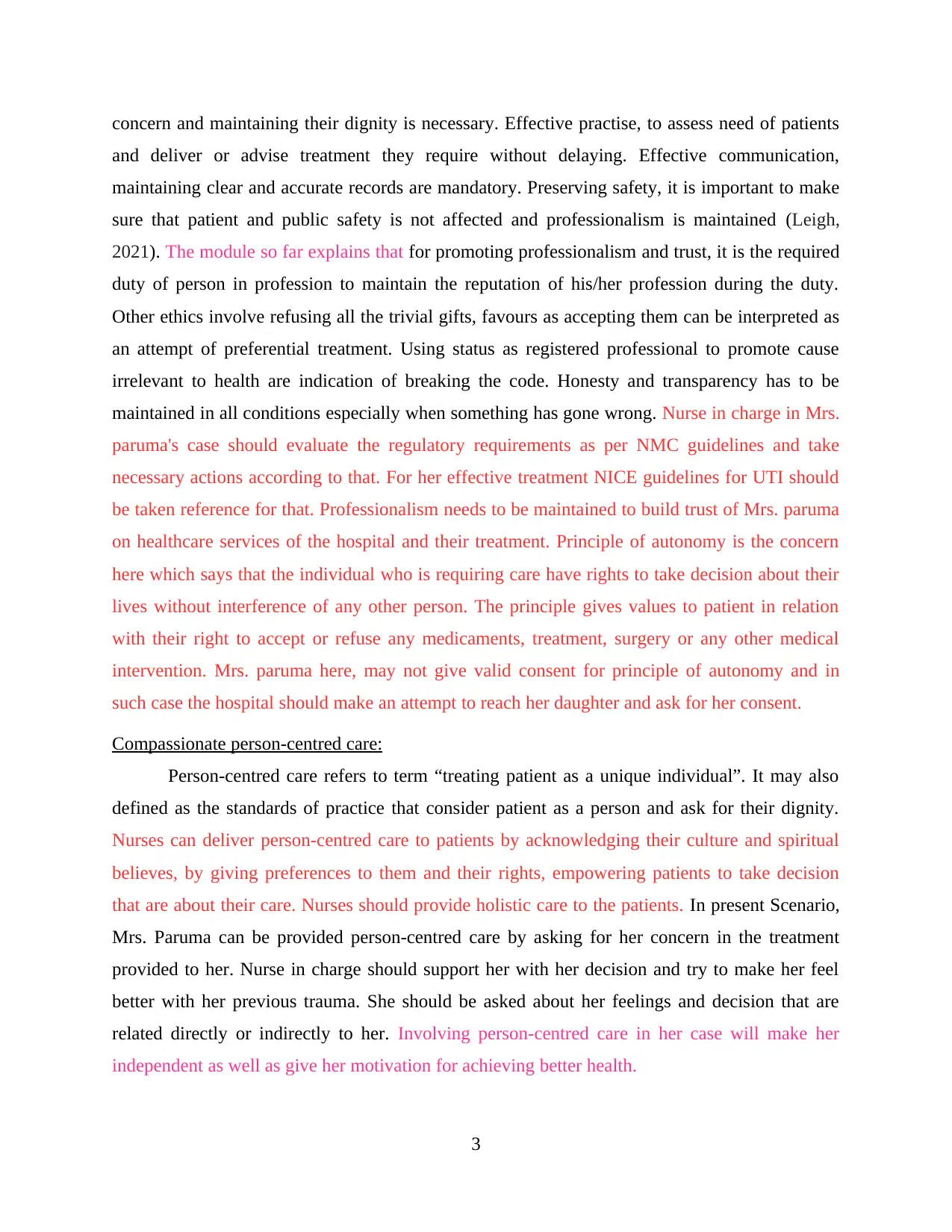
concern and maintaining their dignity is necessary. Effective practise, to assess need of patients
and deliver or advise treatment they require without delaying. Effective communication,
maintaining clear and accurate records are mandatory. Preserving safety, it is important to make
sure that patient and public safety is not affected and professionalism is maintained (Leigh,
2021). The module so far explains that for promoting professionalism and trust, it is the required
duty of person in profession to maintain the reputation of his/her profession during the duty.
Other ethics involve refusing all the trivial gifts, favours as accepting them can be interpreted as
an attempt of preferential treatment. Using status as registered professional to promote cause
irrelevant to health are indication of breaking the code. Honesty and transparency has to be
maintained in all conditions especially when something has gone wrong. Nurse in charge in Mrs.
paruma's case should evaluate the regulatory requirements as per NMC guidelines and take
necessary actions according to that. For her effective treatment NICE guidelines for UTI should
be taken reference for that. Professionalism needs to be maintained to build trust of Mrs. paruma
on healthcare services of the hospital and their treatment. Principle of autonomy is the concern
here which says that the individual who is requiring care have rights to take decision about their
lives without interference of any other person. The principle gives values to patient in relation
with their right to accept or refuse any medicaments, treatment, surgery or any other medical
intervention. Mrs. paruma here, may not give valid consent for principle of autonomy and in
such case the hospital should make an attempt to reach her daughter and ask for her consent.
Compassionate person-centred care:
Person-centred care refers to term “treating patient as a unique individual”. It may also
defined as the standards of practice that consider patient as a person and ask for their dignity.
Nurses can deliver person-centred care to patients by acknowledging their culture and spiritual
believes, by giving preferences to them and their rights, empowering patients to take decision
that are about their care. Nurses should provide holistic care to the patients. In present Scenario,
Mrs. Paruma can be provided person-centred care by asking for her concern in the treatment
provided to her. Nurse in charge should support her with her decision and try to make her feel
better with her previous trauma. She should be asked about her feelings and decision that are
related directly or indirectly to her. Involving person-centred care in her case will make her
independent as well as give her motivation for achieving better health.
3
and deliver or advise treatment they require without delaying. Effective communication,
maintaining clear and accurate records are mandatory. Preserving safety, it is important to make
sure that patient and public safety is not affected and professionalism is maintained (Leigh,
2021). The module so far explains that for promoting professionalism and trust, it is the required
duty of person in profession to maintain the reputation of his/her profession during the duty.
Other ethics involve refusing all the trivial gifts, favours as accepting them can be interpreted as
an attempt of preferential treatment. Using status as registered professional to promote cause
irrelevant to health are indication of breaking the code. Honesty and transparency has to be
maintained in all conditions especially when something has gone wrong. Nurse in charge in Mrs.
paruma's case should evaluate the regulatory requirements as per NMC guidelines and take
necessary actions according to that. For her effective treatment NICE guidelines for UTI should
be taken reference for that. Professionalism needs to be maintained to build trust of Mrs. paruma
on healthcare services of the hospital and their treatment. Principle of autonomy is the concern
here which says that the individual who is requiring care have rights to take decision about their
lives without interference of any other person. The principle gives values to patient in relation
with their right to accept or refuse any medicaments, treatment, surgery or any other medical
intervention. Mrs. paruma here, may not give valid consent for principle of autonomy and in
such case the hospital should make an attempt to reach her daughter and ask for her consent.
Compassionate person-centred care:
Person-centred care refers to term “treating patient as a unique individual”. It may also
defined as the standards of practice that consider patient as a person and ask for their dignity.
Nurses can deliver person-centred care to patients by acknowledging their culture and spiritual
believes, by giving preferences to them and their rights, empowering patients to take decision
that are about their care. Nurses should provide holistic care to the patients. In present Scenario,
Mrs. Paruma can be provided person-centred care by asking for her concern in the treatment
provided to her. Nurse in charge should support her with her decision and try to make her feel
better with her previous trauma. She should be asked about her feelings and decision that are
related directly or indirectly to her. Involving person-centred care in her case will make her
independent as well as give her motivation for achieving better health.
3
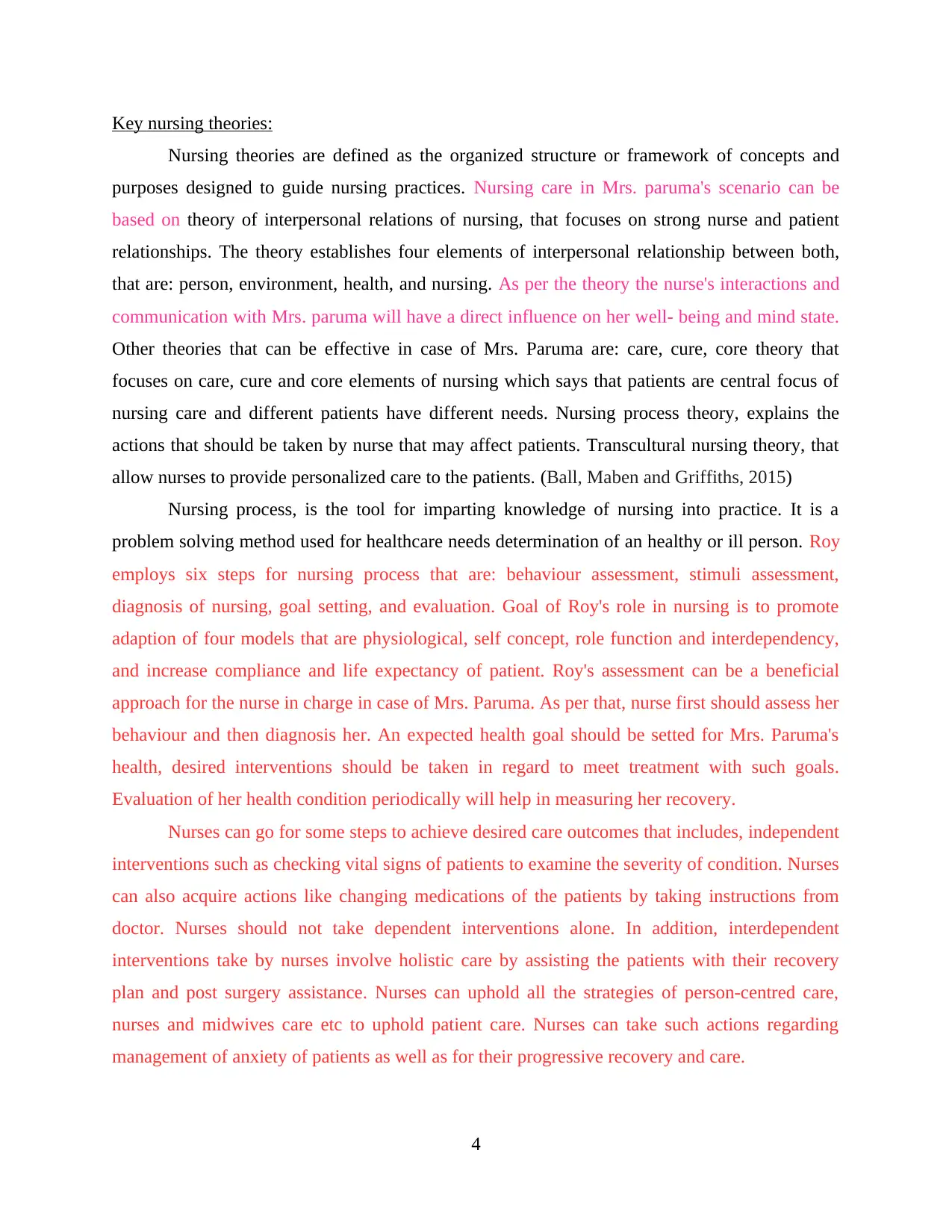
Key nursing theories:
Nursing theories are defined as the organized structure or framework of concepts and
purposes designed to guide nursing practices. Nursing care in Mrs. paruma's scenario can be
based on theory of interpersonal relations of nursing, that focuses on strong nurse and patient
relationships. The theory establishes four elements of interpersonal relationship between both,
that are: person, environment, health, and nursing. As per the theory the nurse's interactions and
communication with Mrs. paruma will have a direct influence on her well- being and mind state.
Other theories that can be effective in case of Mrs. Paruma are: care, cure, core theory that
focuses on care, cure and core elements of nursing which says that patients are central focus of
nursing care and different patients have different needs. Nursing process theory, explains the
actions that should be taken by nurse that may affect patients. Transcultural nursing theory, that
allow nurses to provide personalized care to the patients. (Ball, Maben and Griffiths, 2015)
Nursing process, is the tool for imparting knowledge of nursing into practice. It is a
problem solving method used for healthcare needs determination of an healthy or ill person. Roy
employs six steps for nursing process that are: behaviour assessment, stimuli assessment,
diagnosis of nursing, goal setting, and evaluation. Goal of Roy's role in nursing is to promote
adaption of four models that are physiological, self concept, role function and interdependency,
and increase compliance and life expectancy of patient. Roy's assessment can be a beneficial
approach for the nurse in charge in case of Mrs. Paruma. As per that, nurse first should assess her
behaviour and then diagnosis her. An expected health goal should be setted for Mrs. Paruma's
health, desired interventions should be taken in regard to meet treatment with such goals.
Evaluation of her health condition periodically will help in measuring her recovery.
Nurses can go for some steps to achieve desired care outcomes that includes, independent
interventions such as checking vital signs of patients to examine the severity of condition. Nurses
can also acquire actions like changing medications of the patients by taking instructions from
doctor. Nurses should not take dependent interventions alone. In addition, interdependent
interventions take by nurses involve holistic care by assisting the patients with their recovery
plan and post surgery assistance. Nurses can uphold all the strategies of person-centred care,
nurses and midwives care etc to uphold patient care. Nurses can take such actions regarding
management of anxiety of patients as well as for their progressive recovery and care.
4
Nursing theories are defined as the organized structure or framework of concepts and
purposes designed to guide nursing practices. Nursing care in Mrs. paruma's scenario can be
based on theory of interpersonal relations of nursing, that focuses on strong nurse and patient
relationships. The theory establishes four elements of interpersonal relationship between both,
that are: person, environment, health, and nursing. As per the theory the nurse's interactions and
communication with Mrs. paruma will have a direct influence on her well- being and mind state.
Other theories that can be effective in case of Mrs. Paruma are: care, cure, core theory that
focuses on care, cure and core elements of nursing which says that patients are central focus of
nursing care and different patients have different needs. Nursing process theory, explains the
actions that should be taken by nurse that may affect patients. Transcultural nursing theory, that
allow nurses to provide personalized care to the patients. (Ball, Maben and Griffiths, 2015)
Nursing process, is the tool for imparting knowledge of nursing into practice. It is a
problem solving method used for healthcare needs determination of an healthy or ill person. Roy
employs six steps for nursing process that are: behaviour assessment, stimuli assessment,
diagnosis of nursing, goal setting, and evaluation. Goal of Roy's role in nursing is to promote
adaption of four models that are physiological, self concept, role function and interdependency,
and increase compliance and life expectancy of patient. Roy's assessment can be a beneficial
approach for the nurse in charge in case of Mrs. Paruma. As per that, nurse first should assess her
behaviour and then diagnosis her. An expected health goal should be setted for Mrs. Paruma's
health, desired interventions should be taken in regard to meet treatment with such goals.
Evaluation of her health condition periodically will help in measuring her recovery.
Nurses can go for some steps to achieve desired care outcomes that includes, independent
interventions such as checking vital signs of patients to examine the severity of condition. Nurses
can also acquire actions like changing medications of the patients by taking instructions from
doctor. Nurses should not take dependent interventions alone. In addition, interdependent
interventions take by nurses involve holistic care by assisting the patients with their recovery
plan and post surgery assistance. Nurses can uphold all the strategies of person-centred care,
nurses and midwives care etc to uphold patient care. Nurses can take such actions regarding
management of anxiety of patients as well as for their progressive recovery and care.
4
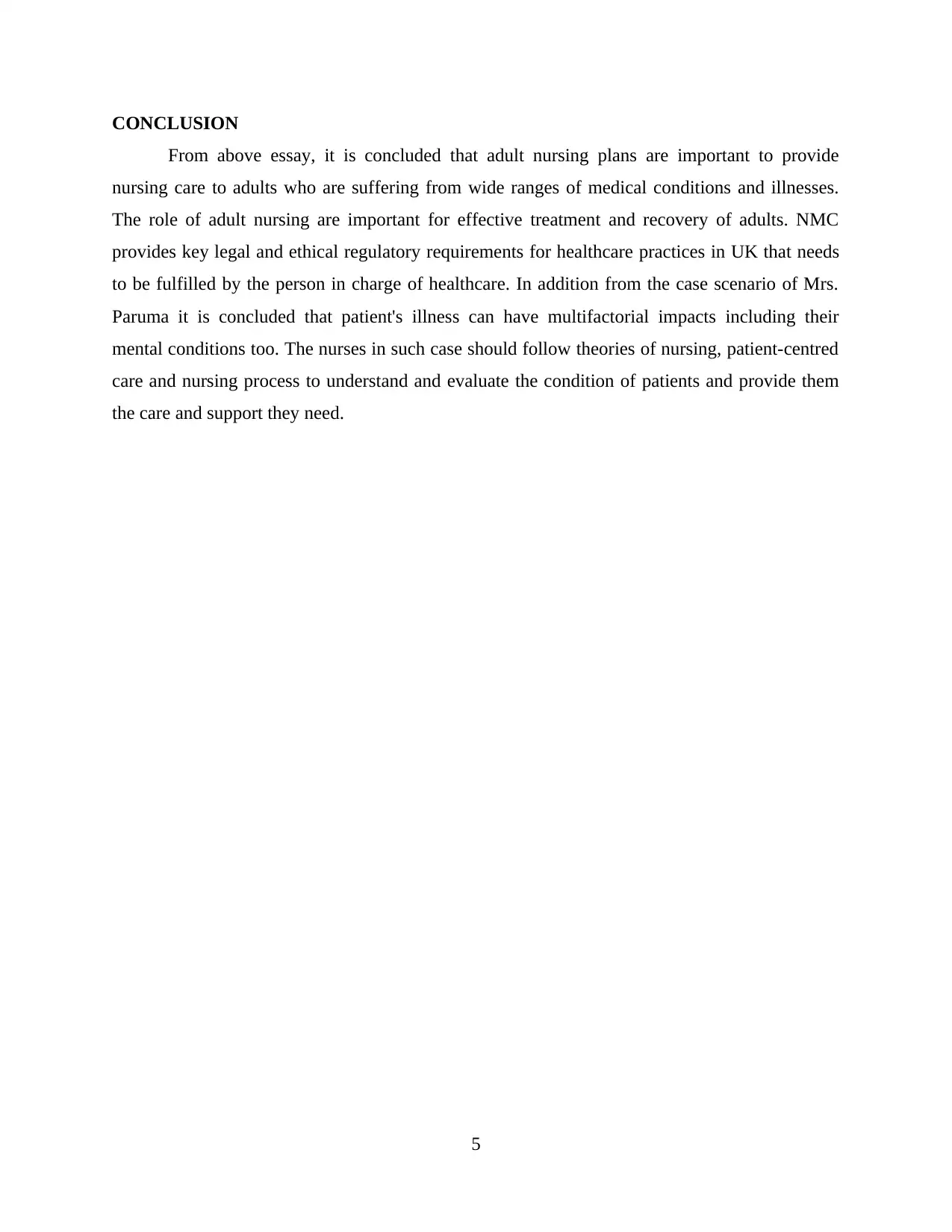
CONCLUSION
From above essay, it is concluded that adult nursing plans are important to provide
nursing care to adults who are suffering from wide ranges of medical conditions and illnesses.
The role of adult nursing are important for effective treatment and recovery of adults. NMC
provides key legal and ethical regulatory requirements for healthcare practices in UK that needs
to be fulfilled by the person in charge of healthcare. In addition from the case scenario of Mrs.
Paruma it is concluded that patient's illness can have multifactorial impacts including their
mental conditions too. The nurses in such case should follow theories of nursing, patient-centred
care and nursing process to understand and evaluate the condition of patients and provide them
the care and support they need.
5
From above essay, it is concluded that adult nursing plans are important to provide
nursing care to adults who are suffering from wide ranges of medical conditions and illnesses.
The role of adult nursing are important for effective treatment and recovery of adults. NMC
provides key legal and ethical regulatory requirements for healthcare practices in UK that needs
to be fulfilled by the person in charge of healthcare. In addition from the case scenario of Mrs.
Paruma it is concluded that patient's illness can have multifactorial impacts including their
mental conditions too. The nurses in such case should follow theories of nursing, patient-centred
care and nursing process to understand and evaluate the condition of patients and provide them
the care and support they need.
5
Paraphrase This Document
Need a fresh take? Get an instant paraphrase of this document with our AI Paraphraser
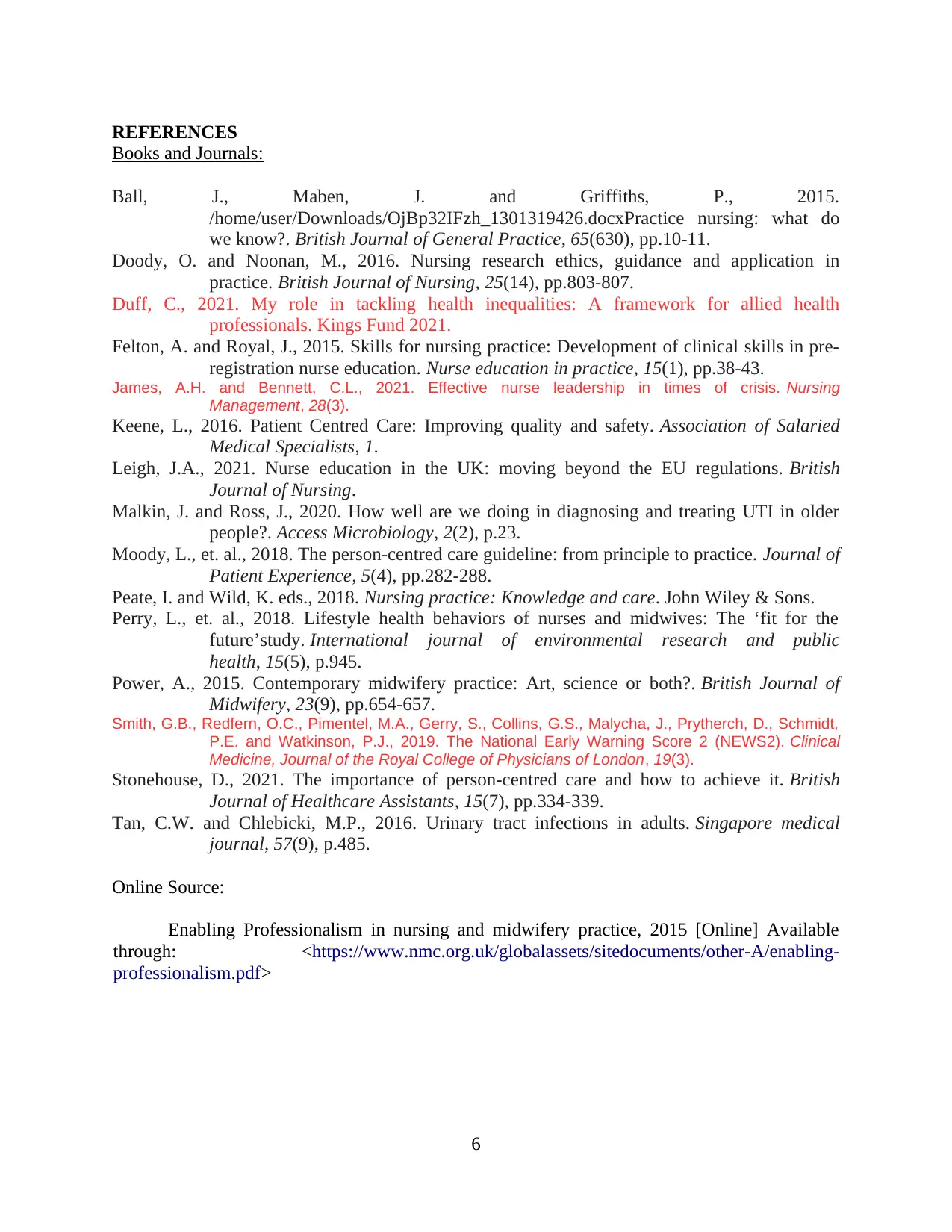
REFERENCES
Books and Journals:
Ball, J., Maben, J. and Griffiths, P., 2015.
/home/user/Downloads/OjBp32IFzh_1301319426.docxPractice nursing: what do
we know?. British Journal of General Practice, 65(630), pp.10-11.
Doody, O. and Noonan, M., 2016. Nursing research ethics, guidance and application in
practice. British Journal of Nursing, 25(14), pp.803-807.
Duff, C., 2021. My role in tackling health inequalities: A framework for allied health
professionals. Kings Fund 2021.
Felton, A. and Royal, J., 2015. Skills for nursing practice: Development of clinical skills in pre-
registration nurse education. Nurse education in practice, 15(1), pp.38-43.
James, A.H. and Bennett, C.L., 2021. Effective nurse leadership in times of crisis. Nursing
Management, 28(3).
Keene, L., 2016. Patient Centred Care: Improving quality and safety. Association of Salaried
Medical Specialists, 1.
Leigh, J.A., 2021. Nurse education in the UK: moving beyond the EU regulations. British
Journal of Nursing.
Malkin, J. and Ross, J., 2020. How well are we doing in diagnosing and treating UTI in older
people?. Access Microbiology, 2(2), p.23.
Moody, L., et. al., 2018. The person-centred care guideline: from principle to practice. Journal of
Patient Experience, 5(4), pp.282-288.
Peate, I. and Wild, K. eds., 2018. Nursing practice: Knowledge and care. John Wiley & Sons.
Perry, L., et. al., 2018. Lifestyle health behaviors of nurses and midwives: The ‘fit for the
future’study. International journal of environmental research and public
health, 15(5), p.945.
Power, A., 2015. Contemporary midwifery practice: Art, science or both?. British Journal of
Midwifery, 23(9), pp.654-657.
Smith, G.B., Redfern, O.C., Pimentel, M.A., Gerry, S., Collins, G.S., Malycha, J., Prytherch, D., Schmidt,
P.E. and Watkinson, P.J., 2019. The National Early Warning Score 2 (NEWS2). Clinical
Medicine, Journal of the Royal College of Physicians of London, 19(3).
Stonehouse, D., 2021. The importance of person-centred care and how to achieve it. British
Journal of Healthcare Assistants, 15(7), pp.334-339.
Tan, C.W. and Chlebicki, M.P., 2016. Urinary tract infections in adults. Singapore medical
journal, 57(9), p.485.
Online Source:
Enabling Professionalism in nursing and midwifery practice, 2015 [Online] Available
through: <https://www.nmc.org.uk/globalassets/sitedocuments/other-A/enabling-
professionalism.pdf>
6
Books and Journals:
Ball, J., Maben, J. and Griffiths, P., 2015.
/home/user/Downloads/OjBp32IFzh_1301319426.docxPractice nursing: what do
we know?. British Journal of General Practice, 65(630), pp.10-11.
Doody, O. and Noonan, M., 2016. Nursing research ethics, guidance and application in
practice. British Journal of Nursing, 25(14), pp.803-807.
Duff, C., 2021. My role in tackling health inequalities: A framework for allied health
professionals. Kings Fund 2021.
Felton, A. and Royal, J., 2015. Skills for nursing practice: Development of clinical skills in pre-
registration nurse education. Nurse education in practice, 15(1), pp.38-43.
James, A.H. and Bennett, C.L., 2021. Effective nurse leadership in times of crisis. Nursing
Management, 28(3).
Keene, L., 2016. Patient Centred Care: Improving quality and safety. Association of Salaried
Medical Specialists, 1.
Leigh, J.A., 2021. Nurse education in the UK: moving beyond the EU regulations. British
Journal of Nursing.
Malkin, J. and Ross, J., 2020. How well are we doing in diagnosing and treating UTI in older
people?. Access Microbiology, 2(2), p.23.
Moody, L., et. al., 2018. The person-centred care guideline: from principle to practice. Journal of
Patient Experience, 5(4), pp.282-288.
Peate, I. and Wild, K. eds., 2018. Nursing practice: Knowledge and care. John Wiley & Sons.
Perry, L., et. al., 2018. Lifestyle health behaviors of nurses and midwives: The ‘fit for the
future’study. International journal of environmental research and public
health, 15(5), p.945.
Power, A., 2015. Contemporary midwifery practice: Art, science or both?. British Journal of
Midwifery, 23(9), pp.654-657.
Smith, G.B., Redfern, O.C., Pimentel, M.A., Gerry, S., Collins, G.S., Malycha, J., Prytherch, D., Schmidt,
P.E. and Watkinson, P.J., 2019. The National Early Warning Score 2 (NEWS2). Clinical
Medicine, Journal of the Royal College of Physicians of London, 19(3).
Stonehouse, D., 2021. The importance of person-centred care and how to achieve it. British
Journal of Healthcare Assistants, 15(7), pp.334-339.
Tan, C.W. and Chlebicki, M.P., 2016. Urinary tract infections in adults. Singapore medical
journal, 57(9), p.485.
Online Source:
Enabling Professionalism in nursing and midwifery practice, 2015 [Online] Available
through: <https://www.nmc.org.uk/globalassets/sitedocuments/other-A/enabling-
professionalism.pdf>
6
1 out of 8
Related Documents
Your All-in-One AI-Powered Toolkit for Academic Success.
+13062052269
info@desklib.com
Available 24*7 on WhatsApp / Email
![[object Object]](/_next/static/media/star-bottom.7253800d.svg)
Unlock your academic potential
© 2024 | Zucol Services PVT LTD | All rights reserved.





